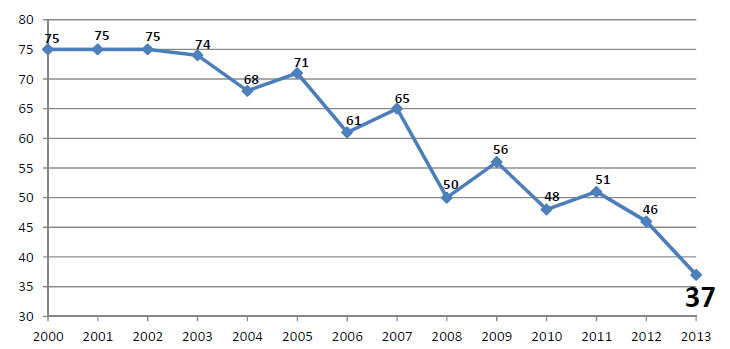|
Six Nations
Six Nations sinks to new low
Graham Jenkins
April 25, 2013

Wales made it back-to-back Six Nations titles with victory over England in their title showdown last month
© PA Photos
Enlarge
This year's Six Nations battle produced an average of just 2.5 tries per game - not only the lowest figure in championship history, but also the lowest in the 18 years since the game went professional in 1995. The alarming stat has been highlighted in the International Rugby Board's official analysis that details how the number of tries has decreased steadily since 2000 - the first staging of the Six Nations. The reports states that this year there were 37, or 51%, fewer tries scored than in 2000. In the last two years (2012/2013) a total of 83 tries were scored, but in 2000 and 2001 the comparative figure was 150, a difference of 77 tries. Wales, who claimed the Six Nations title, were the only team to score in every match that they played this year, while England scored only one try in their last four matches.
Graphic: The number of tries in the Six Nations has decreased steadily since 2000 (IRB) There is more uncomfortable reading for Europe's finest when it comes to scrums. The latest analysis highlights the fact that "the core problems at Tier One level continue and are increasing, with more scrums collapsing and, for the first time in any Tier One tournament, over half of all scrums ended with a penalty or free kick." Three of the six teams - Wales, Scotland and England - failed to score a single try from scrum possession, with just five tries in total resulting from that kind of set-piece. This compares with 11 from lineouts, 11 from opponents' kicks and eight from turnovers.
Graphic: For the first time in any Tier One tournament, over half of all scrums ended with a penalty or free kick (IRB)
The extent of the problem is illustrated by one match - Wales v England. This match resulted
in:
The report comments that, "problems relating to current scrums are also having an effect on the shape of the game. With fewer scrums taking place and more penalties and free kicks being awarded, possession from the scrum has now become a less significant part of the game." It adds: "It appears that the benefit from scrums comes not so much from possession, but from the penalties and free kicks they manage to obtain. Wales and England, for example, each obtained the ball from their own scrum just 13 times in their five matches while receiving 20 and 17 penalties and free kicks respectively." While tries decreased this year, penalty goals increased with the 6.3 per match average the highest since the Five Nations Championship restarted after the Second World War in 1947. However, tries still remain the most significant element in winning matches with 60% of games won by the team crossing the whitewash the most times. Click here for the full Six Nations analysis © ESPN Sports Media Ltd. Graham Jenkins is the Senior Editor of ESPNscrum and you can also follow him on Twitter.
|
Live Sports
Communication error please reload the page.
-
Football
-
Cricket
-
Rugby
-
- Days
- Hrs
- Mins
- Secs
F1 - Abu Dhabi GP
Abu Dhabi Grand Prix December 11-131. Max Verstappen ()
2. Valtteri Bottas (Mercedes)
3. Lewis Hamilton (Mercedes)
4. Alexander Albon ()
5. Lando Norris ()
6. Carlos Sainz Jr ()
-
ESPNOtherLive >>
Darts - Premier League
Golf - Houston Open
Snooker - China Open
Tennis - Miami Open



